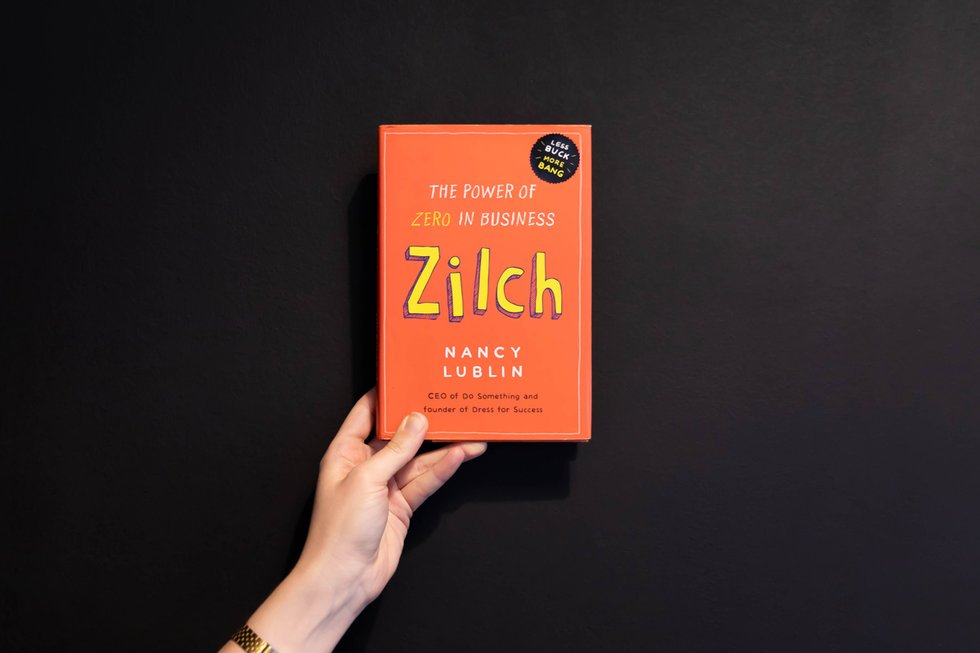Doing more with less: The Power of Zero in Business
Apr 01, 2019
6 mins

AD
Fondateur, auteur, rédacteur @Word Shaper
Nancy Lublin’s book Zilch: The Power of Zero in Business, published in 2010, sets out practical steps to show how we can do more with less, by reducing our reliance on financial aspects and increasing our insight. In the book, Lublin aims to demonstrate the power of what she terms “zilch.”
The founder of Dress for Success, a non-profit organisation that helps unemployed women prepare for job interviews and supports them once they’re in the workplace, Lublin currently manages Crisis Text Line, a text-messaging helpline for those in need that is staffed by volunteers. Although her experience mainly lies in the world of non-profit, she is still able to draw comparisons with the corporate world and traditional companies. Here, she offers a raft of “little tricks” that can be easily used to help you make the most of the tools you already have and achieve both short- and long-term results.
If money is no longer a carrot worth dangling, how can you get the best from your employees?
Give a sense of purpose
Often, one of the greatest factors in terms of motivation is money. But there are also other incentives you could use: workers who are driven usually have personal goals that are in line with those of the company they’re working for; they’re seeking personal achievement and recognition. We all want to do something exciting that leaves us with a sense of meaning and pride in both our life and work. But if money is no longer a carrot worth dangling, how can you get the best from your employees with your limited resources?
Lublin recommends looking at what makes employees get out of bed in the morning, such as to serve a purpose, feel accomplished, have fun, and finding a way to deliver that on a day-to-day basis. For example, what works really well is coming up with a high-quality product that will unite employees and make them proud to represent the organisation. Lublin stresses that creating a shared narrative doesn’t cost anything, but it does create a bond within the team and make them feel more personally invested.
She also believes that a certain level of transparency is needed within the company, so that employees don’t feel that things are being hidden from them, or that people are being treated differently. Maintaining transparency across all the decision-making that occurs within the company sets an excellent example and makes employees feel like they have a full role to play in the business.
If you want employees who are passionate and fully engaged with what they do but it isn’t possible to use money as a motivating factor, how you recruit is key. Find out what the candidates’ best assets are and adapt your hiring criteria so that you can really measure how much dedication they will show. Do they display outward enthusiasm? Good engagement? The ability to be a good spokesperson for the company?
Reducing a company’s budget often makes it become more creative
Manage the budget
Another important factor to consider when launching a business with next to nothing is, of course, the budget. In the non-profit world, the aim isn’t to maximize profit. Usually, this kind of business is good at sticking to its budget, planning ahead and not losing revenue. Lublin demonstrates how we can learn from this. Non-profit organisations are terrified of making unnecessary expenditure they hadn’t planned for, so they learn to be disciplined and constantly evaluate each expense. Looking at your budget with a view to diversifying your investments and sources of income over a longer period can also help with unexpected situations and, of course, reduce your risk.
Once you’ve made a start, it’s tempting to increase budget estimates rather than risk cutting them down. Lublin, however, recommends being realistic and suggests constantly monitoring the incomings and outgoings of your organisation.
She goes on to say that reducing a company’s budget can often make it more creative. Facing constraints makes companies think differently and more innovatively than if they had endless resources.
Give only what’s necessary, take only what’s needed

Do what you can with what you have: the exchange
Like many companies, non-profit organisation often start out with limited means and little visibility. Using exchange as a solution is an interesting concept and pushes relationships beyond simply materialistic considerations. In this, Lublin sees the opportunity to create an exchange of skills and ideas, the aim being to maximize flexibility, creativity, and trust within your company and among its partners. It’s a way of helping each other out, even if it might not be seen as the most professional way of doing things, since it can be difficult to quantify. It’s the best way of getting hold of products and services at a low price, such as software, supplies, or product placement. Start small, then move on to achieving some more impressive tradeoffs later.
To keep your exchange positive, Lublin recommends the following:
Clearly identify your assets, both human and financial
What does your company really have a lot of? If it’s something worth selling, the conditions are perfect for an exchange. For example, if you sell supplies, why not offer them to other companies so they can furnish their offices and, in exchange, offer you a good price on their services?
Identify your shortcomings
What are your weaknesses and needs?
Look for partnerships.
Look to those around you and the companies you already know, use your social networks.
Formalize your exchange
From the outset, it’s important to agree on what you’re offering, what the terms are and what you’ll gain in return.
Follow the development of the exchange
Even if the agreement starts out well, things don’t always end that way. Make sure you maintain the quality of the exchange until the end.
Adapt
If it becomes clear that the exchange agreement isn’t totally equal, try to change its terms so that neither party is out of pocket. It’s important that both sides feel that they’ve gained in some way and give a service or product of equal value.
To conclude, if you want to be satisfied with the exchange you’re undertaking, it’s necessary to analyze, prepare, and clearly define exactly what you’ll give and what you’ll get back.
Throughout her book, Lublin insists we should dare to ask for the impossible, because it can very often have surprising results. The real advantage of this kind of exchange when a company is starting out is that what it is able to give is based purely on the resources it has, and what it receives is based on its needs, unlike in more traditional transactions.
Management
Hasn’t everything already been said about how best to manage a company’s different departments? Much of Lublin’s advice emphasizes the importance of creating first-hand experiences: don’t forget to thank employees personally for good work, try to create a lighthearted and relaxed atmosphere, encourage training, and so on. However, it can be difficult to apply these suggestions, because sometimes it’s tricky to move away from the traditional way of working, even though it might only take a few small changes to make a huge difference—especially when you’re starting out or when you have reduced means.
Lublin thinks it’s important that everyone gets involved in every aspect of work within a company. If you carry on responding personally to your emails and phone, instead of delegating it to a more junior employee, and participate in all tasks, whatever they may be, you’ll gain a better perspective of the company and your own goals. Setting deadlines is also another good way of ensuring everyone stays focused on what they are doing. Employing fewer people will help save you money and also keep everyone working efficiently—having a smaller workforce means there’s no chance of anyone getting bored!
Lastly, in some companies, the founder is viewed as untouchable and someone everyone looks up to. However, Lublin suggests that all staff should have the chance to shine in a company at some point. If employees feel that sort of position is out of reach, they can lose their sense of dedication and adopt the belief that they will never be able to rise through the ranks themselves.
Everyone should have the chance to shine in a company at some point
Throughout Lublin’s book, we see how she has been empowered by her experiences as the head of non-profit organisations, steering them toward success. Her advice is simple, rational, sometimes rather frank, but alway effective. Her comparisons between the non-profit world and commercial business are always clear, and the goal ultimately seems to be the same: achieve the most possible with less—or even, “zilch.” In everything, from communication through to the management of the board of directors and implementing innovative strategies, this influential businesswoman shares her valuable trade secrets. She highlights the many resources most of us have right under our noses that go unused and cost nothing. That’s essentially the power of zero in business.
Translated by Matthew Docherty
Photo: Welcome to the Jungle
Follow Welcome to the Jungle on Facebook on LinkedIn and on Instagram and subscribe to our newsletter to get our latest articles every week!

More inspiration: Inspiration for decision-makers

Business ethics: how to do the right thing in a turbulent world
Alison Taylor's background is one of the reasons she talks about ethics in a way that makes sense to non-specialists. Here’s what we asked.
Mar 09, 2022

Managers: how to take care of yourself before you reach breaking point
Being a manager isn’t a relaxing job. Good leaders have to deal with serious issues. That’s why it’s essential...
Feb 28, 2022

Sorry, but you're already living in the "Squid Game"
Meritocracy, infantilization and more. What if we told you Squid Game held up a mirror to our modern workplace? Here are 6 elements of proof.
Nov 18, 2021

James Flint: from tech journalist to tech for good
As one of the pioneers in tech journalism, James Flint parlayed his extensive experience to create Hospify & champion digital data privacy.
Jun 02, 2021

The making of a start-up: Ben Prouty on Poncho and other ventures
Ben Prouty on being a serial founder, when to step away and launching Poncho, a pioneering childcare company.
Feb 18, 2021
Inside the jungle: The HR newsletter
Studies, events, expert analysis, and solutions—every two weeks in your inbox

